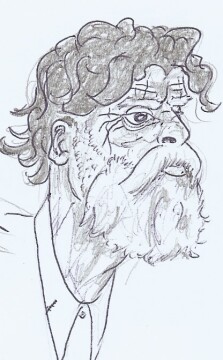Tolliver Groat
| Mr. Groat | |
 | |
| Name | Tolliver Groat |
| Race | Human |
| Age | over 50 |
| Occupation | Postman |
| Physical appearance | old, bearded, smelly. Wears an abysmal wig which made several valiant independent attempts to escape from hospital custody. |
| Residence | Ankh-Morpork Post Office |
| Death | Once feared dying as the oldest Junior Postman ever, but can now go to his ancestors with pride at being Deputy Postmaster-General. |
| Parents | Comes from one of those long-standing Post Office families. |
| Relatives | all appear to have been Sorted and Returned To Sender. |
| Children | none, but in a very real sense he did adopt Stanley Howler and helped ease his transition from the world of peas to the world of people. |
| Marital Status | single, but in Wintersmith we learn of the existance of a possible soon-to-be-Mrs. Groat. |
| Appearances | |
| Books | Going Postal, Making Money |
| Cameos | Wintersmith |
One of the last two postmen remaining at the beginning of Going Postal. Severely distrusts doctors, so he brews his own medicine and has his own little cures to keep himself in good condition. Paradoxically, several years' worth of an application of bread pudding and goose grease to his chest (Tolliver is not a believer in baths) actually did save his life when he was attacked by a wild banshee who mistook him for Moist von Lipwig because he was wearing the Hat at the time. This meant that the long killing claws merely gashed his chest and did not penetrate any deeper.
His trousers, permeated as they were with charcoal, nitre and sulphur to keep disease at bay, were the only known subject of a controlled detonation in a medical environment. As he resisted all attempts to give him a bath while in the care of the Lady Sybil Free Hospital, Dr John Lawn was more than happy to discharge him into the care of Moist, for a large "donation" of course.
Not only is his trousers filled with sulfur but so is his socks as he fills them with sulfur every morning, sulfur stolen by the Wintersmith one morning to make himself a man.
He is fluent in the only rhyming slang known to the Discworld that does not actually rhyme.
In Making Money, Groat is elevated from Junior Postman to Acting Postmaster, with full Hat-wearing privileges, to cover for Moist von Lipwig while he is busy with the Bank and Mint. Not bad for a man who we first met as the oldest Junior Postman in town... and things continue to look up for Mr. Groat, as in Wintersmith we learn that he is "walking out" with a widow who has the same attitude to self-medication that he has. Evidently she has no sense of smell, and certainly the Deputy Postmaster-General is a more desirable catch than a mere Senior Postman?
In just 2 novels Groat manages to collect a rather astonishing amount of titles.
- Junior Postman
- Senior postman
- Assistant Postmaster
- Deputy Postmaster
- Acting Postmaster
- Postal Inspector
Annotation
The name, the character description, and the Gormenghast-like Post office building, are straight out of Mervyn Peake: Tolliver Groat's personal take on the grotesque means that he could walk in to Peake's fantasy virtually as is. Possible annotation, or just something to refer to in passing? Indeed, Groat's dogged adherence to rule and ritual, his having practically memorised the Post Office rulebook long after the system has effectively collapsed and his insistence the rules still be followed because, well, they are the Rules, is reminiscent of Ghormenghast's Master of Ceremonies, the ageing, repellent, and soap-innocent Barquentine. Moist von Lipwig has arrived in the Post Office system in time to be a less malevolent Steerpike - ie, the character who shakes the system up and reinvigorates it. (Hmmm, Moist as Steerpike in a Ghormwenghast-like system - the manipulative outsider who causes a stir and gets things done).
Groat is also a coin from the Middle Ages on Roundworld. Although it was worth four pence (the name coming from the German 'Gross' because of its extra thickness) and was only officially discontinued in Britain in 1860, it is now used in 21st century writing/filming as a generic medieval coin of little value.